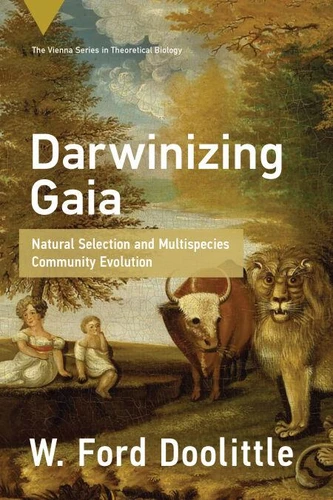Darwinizing Gaia. Natural Selection and Multispecies Community Evolution
Par :Formats :
Disponible dans votre compte client Decitre ou Furet du Nord dès validation de votre commande. Le format ePub protégé est :
- Compatible avec une lecture sur My Vivlio (smartphone, tablette, ordinateur)
- Compatible avec une lecture sur liseuses Vivlio
- Pour les liseuses autres que Vivlio, vous devez utiliser le logiciel Adobe Digital Edition. Non compatible avec la lecture sur les liseuses Kindle, Remarkable et Sony
- Non compatible avec un achat hors France métropolitaine
 , qui est-ce ?
, qui est-ce ?Notre partenaire de plateforme de lecture numérique où vous retrouverez l'ensemble de vos ebooks gratuitement
Pour en savoir plus sur nos ebooks, consultez notre aide en ligne ici
- Nombre de pages272
- FormatePub
- ISBN978-0-262-38062-1
- EAN9780262380621
- Date de parution03/12/2024
- Protection num.Adobe DRM
- Taille3 Mo
- Infos supplémentairesepub
- ÉditeurThe MIT Press
Résumé
A reinterpretation of James Lovelock's Gaia Hypothesis through the lens of Darwinian natural selection and multispecies community evolution. First conceived in the 1970s, James Lovelock's Gaia Hypothesis proposed that living organisms developed in tandem with their inorganic surroundings, forming a complex, self-regulating system. Today, most evolutionary biologists consider the theory problematic.
In Darwinizing Gaia, W. Ford Doolittle, one of evolutionary and molecular biology's most prestigious thinkers, reformulates what evolution by natural selection is while legitimizing the controversial Gaia Hypothesis. As the first book attempting to reconcile Gaia with Darwinian thinking, and the first on persistence-based evolution, Doolittle's clear, innovative position broadens evolutionary theory by offering potential remedies for Gaia's theoretical challenges.
Unquestionably, the current "polycrisis" is the most complex that Homo sapiens has ever faced, and this book can help overcome the widespread belief that evolutionary biologists don't believe Lovelock. Written in the tradition of Richard Dawkins's The Selfish Gene, Darwinizing Gaia will appeal to students, evolutionary scientists, philosophers, and microbiologists, as well as environmentalists seeking to understand the Earth as a system, at a time when climate change has drawn our planet's structure and function into sharp relief.
In Darwinizing Gaia, W. Ford Doolittle, one of evolutionary and molecular biology's most prestigious thinkers, reformulates what evolution by natural selection is while legitimizing the controversial Gaia Hypothesis. As the first book attempting to reconcile Gaia with Darwinian thinking, and the first on persistence-based evolution, Doolittle's clear, innovative position broadens evolutionary theory by offering potential remedies for Gaia's theoretical challenges.
Unquestionably, the current "polycrisis" is the most complex that Homo sapiens has ever faced, and this book can help overcome the widespread belief that evolutionary biologists don't believe Lovelock. Written in the tradition of Richard Dawkins's The Selfish Gene, Darwinizing Gaia will appeal to students, evolutionary scientists, philosophers, and microbiologists, as well as environmentalists seeking to understand the Earth as a system, at a time when climate change has drawn our planet's structure and function into sharp relief.
A reinterpretation of James Lovelock's Gaia Hypothesis through the lens of Darwinian natural selection and multispecies community evolution. First conceived in the 1970s, James Lovelock's Gaia Hypothesis proposed that living organisms developed in tandem with their inorganic surroundings, forming a complex, self-regulating system. Today, most evolutionary biologists consider the theory problematic.
In Darwinizing Gaia, W. Ford Doolittle, one of evolutionary and molecular biology's most prestigious thinkers, reformulates what evolution by natural selection is while legitimizing the controversial Gaia Hypothesis. As the first book attempting to reconcile Gaia with Darwinian thinking, and the first on persistence-based evolution, Doolittle's clear, innovative position broadens evolutionary theory by offering potential remedies for Gaia's theoretical challenges.
Unquestionably, the current "polycrisis" is the most complex that Homo sapiens has ever faced, and this book can help overcome the widespread belief that evolutionary biologists don't believe Lovelock. Written in the tradition of Richard Dawkins's The Selfish Gene, Darwinizing Gaia will appeal to students, evolutionary scientists, philosophers, and microbiologists, as well as environmentalists seeking to understand the Earth as a system, at a time when climate change has drawn our planet's structure and function into sharp relief.
In Darwinizing Gaia, W. Ford Doolittle, one of evolutionary and molecular biology's most prestigious thinkers, reformulates what evolution by natural selection is while legitimizing the controversial Gaia Hypothesis. As the first book attempting to reconcile Gaia with Darwinian thinking, and the first on persistence-based evolution, Doolittle's clear, innovative position broadens evolutionary theory by offering potential remedies for Gaia's theoretical challenges.
Unquestionably, the current "polycrisis" is the most complex that Homo sapiens has ever faced, and this book can help overcome the widespread belief that evolutionary biologists don't believe Lovelock. Written in the tradition of Richard Dawkins's The Selfish Gene, Darwinizing Gaia will appeal to students, evolutionary scientists, philosophers, and microbiologists, as well as environmentalists seeking to understand the Earth as a system, at a time when climate change has drawn our planet's structure and function into sharp relief.



